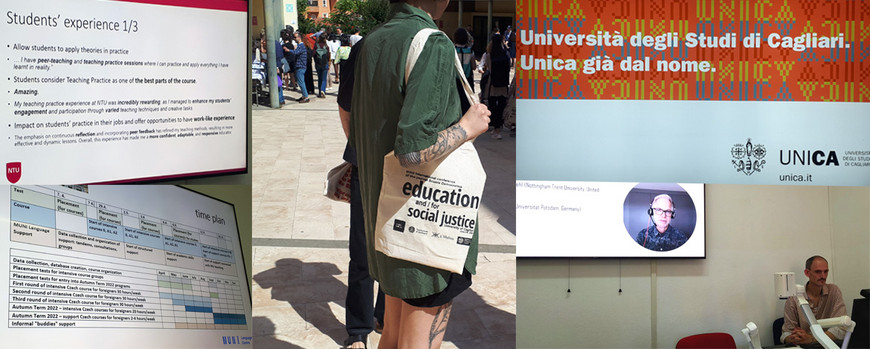Language Learning for Social Justice: Zessko at the Scuola Democratica Conference

From June 3 to 6, 2024, the Scuola Democratica 2024 conference took place at the University of Cagliari, featuring the panel “Language Learning for Social Justice: How University Language Programmes Can Contribute to Reducing Inequalities and Empower Minoritized Communities." The panel was convened by Frank Austermuehl from Nottingham Trent University (UK) and David Prickett (University of Potsdam / Zessko).
Several key connections and observations were highlighted in the presentations. First, the intersection of language education and social justice was discussed. Jirina Karasova and Martin Fico emphasized the importance of culturally responsive and inclusive practices (CRCM) in English learner classrooms. Libor Stepanek highlighted how language centers can play a role in social justice by promoting inclusive practices and empowering marginalized communities.
Additionally, presentations by Silvia Bernardini as well as by Frank Austermuehl and Amy Wang, underscored the critical role of translation and interpreting services. These services are crucial in providing vulnerable populations with access to essential information and services. Both the SLIT (Service Learning, Innovation, and Translation; Bernardini, U Bologna) project and the research by Austermuehl and Wang illustrated how practical, community-engaged projects enrich students' learning experiences while directly benefiting the involved communities. Integrating real-world applications into language programs fosters both student development and community support. The SLIT project showcased the benefits and challenges of service-learning models that create meaningful educational experiences addressing real community needs.
The global and local dimensions of language learning were also discussed. The SLIT project highlighted the value of cross-border partnerships in addressing global language needs and fostering intercultural competence. Austermuehl and Wang's focus on the Midlands region's minoritized communities emphasized the importance of adapting global best practices to meet local contexts effectively.
Challenges and innovations in language education were also addressed. The SLIT project and Austermuehl and Wang's critical view on machine translation highlighted both the opportunities and challenges posed by technological advancements in language education. Stepanek's presentation on the evolving roles of language centers in response to global crises invited discussion on how language programs can remain flexible and responsive to changing global circumstances.
Another key point was building intercultural competence. Presentations by Stella Bunnag and David Prickett on intercultural competence training emphasized the importance of preparing students for diverse, global environments.
The role of institutions and support through policy measures were also discussed. Several presentations addressed the role of institutions in supporting language education for social justice. Discussions included how universities and policymakers can better support these initiatives through funding, curriculum development, and strategic partnerships.
Finally, the evaluation and impact assessment of the programs were discussed. Methods to evaluate the effectiveness of these programs were explored, including quantitative analysis and feedback from intercultural competence training. Overall, the conference provided valuable insights into the connection between language education and social justice, highlighting ways universities can contribute to reducing inequalities and empowering marginalized communities.
David Prickett’s participation in this conference was made possible by EDUC.
Contact: David James Prickett
Published on 24 June, 2024
